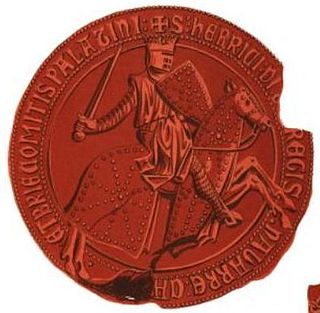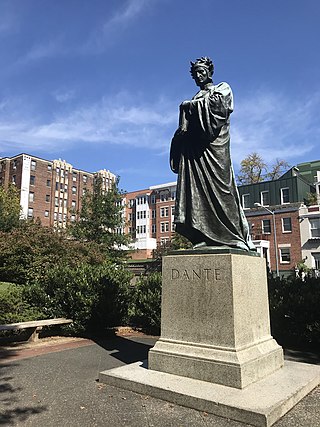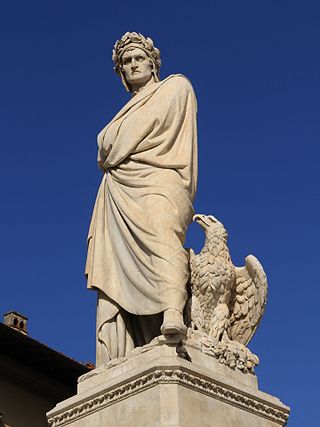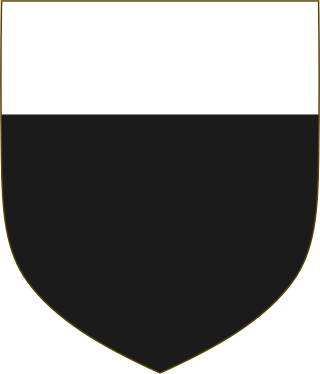Deaths
- Fakhruddin Iraqi (born 1213), Persian Sufi writer
| |||
|---|---|---|---|
| +... |

Dante Alighieri, most likely baptized Durante di Alighiero degli Alighieri and widely known and often referred to in English mononymously as Dante was an Italian poet, writer, and philosopher. His Divine Comedy, originally called Comedìa and later christened Divina by Giovanni Boccaccio, is widely considered one of the most important poems of the Middle Ages and the greatest literary work in the Italian language.

Henry the Fat was King of Navarre and Count of Champagne and Brie from 1270 until his death.

Beatrice "Bice" di Folco Portinari was an Italian woman who has been commonly identified as the principal inspiration for Dante Alighieri's Vita Nuova, and is also identified with the Beatrice who acts as his guide in the last book of his narrative poem the Divine Comedy, Paradiso, and during the conclusion of the preceding Purgatorio. In the Comedy, Beatrice symbolises divine grace and theology.
Guido Guinizelli was an esteemed Italian love poet and is considered the "father" of the Dolce Stil Novo. He was the first to write in this new style of poetry writing, and thus is held to be the ipso facto founder. He was born in, and later exiled from, Bologna, Italy. It is speculated that he died in Verona, Italy.

Francesca da Rimini or Francesca da Polenta was a medieval noblewoman of Ravenna, who was murdered by her husband, Giovanni Malatesta, upon his discovery of her affair with his brother, Paolo Malatesta. She was a contemporary of Dante Alighieri, who portrayed her as a character in the Divine Comedy.
Cavalcante de' Cavalcanti was a Florentine Epicurean philosopher and father of Guido Cavalcanti, a close friend of Dante Alighieri.

The Dante Alighieri Society is a society that promotes Italian culture and language around the world. Today this society is present in more than 60 countries.

Dante Park is a public park in Manhattan, New York City, located in the Upper West Side neighborhood in front of Lincoln Center near Central Park.

Belacqua is a minor character in Dante Alighieri's Purgatorio, Canto IV. He is considered the epitome of indolence and laziness, but he is nonetheless saved from the punishment of Hell in Inferno and often viewed as a comic element in the poem for his wit. The relevance of Belacqua is also driven by Samuel Beckett's strong interest in this character.

Dante Alighieri was the first dreadnought battleship built for the Regia Marina and was completed in 1913. The ship served as a flagship during World War I, but saw very little action other than the Second Battle of Durazzo in 1918 during which she did not engage enemy forces. She never fired her guns in anger during her career. Dante Alighieri was refitted in 1923, stricken from the Navy List five years later and subsequently sold for scrap.

Scuola Italiana Dante Alighieri, better known as Colegio Dante Alighieri, is a traditional, and one of the oldest, Italian private school in Paraguay. The school is named after the famous Italian poet, Dante Alighieri.

The Man Who Quit Smoking is a 1972 Swedish comedy film directed by Tage Danielsson, starring Gösta Ekman, Grynet Molvig, Carl-Gustaf Lindstedt and Gunn Wållgren. The film is known as a Hasse & Tage film and is a great cult classic in Sweden.
Calcabrina is one of the demons featured in Inferno, the first canticle of Dante Alighieri's Divine Comedy. Calcabrina's name is possibly meant to mean "grace-stomper" or "frost trampler."

Dante Alighieri, is a public artwork by Italian artist Ettore Ximenes, located at Meridian Hill Park in Washington, D.C., United States. Dante Alighieri was originally surveyed as part of the Smithsonian Institution's Save Outdoor Sculpture! survey in 1994. The monument is a tribute to Italian poet Dante Alighieri.
Jacopo Alighieri was an Italian poet, the son of Dante Alighieri, whom he followed in his exile. Jacopo's most famous work is his sixty-chapter Dottrinale. He is represented by his father in the Paradiso of the Divine Comedy as Saint James along with Saint Peter and Saint John the Evangelist, representing his brothers Pietro and Giovanni.

Dante Alighieri Academy also known as Dante Alighieri Academy Catholic Secondary School is a Catholic public high school in Toronto, Ontario, Canada. Administered by the Toronto Catholic District School Board, it serves the Glen Park neighbourhood in the North York district. It has 926 students from grades 9-12 as of 2018–19. It was founded in 1974 by the Sisters of St. John the Baptist, and is named after Dante Alighieri, a major Italian poet of the Middle Ages in the 13th century.
PLIDA, or Progetto Lingua Italiana Dante Alighieri, are language diplomas issued by Dante Alighieri Society certifying the holder's proficiency in Italian language as a foreign language. The diplomas could only be obtained after passing a standardised language test. The Rome Branch of the Dante Alighieri Society is the official centre of examination for the issuing of PLIDA Certification.

Escuela Dante Alighieri is a private Italian international school in Córdoba, Argentina. It serves jardín, primaria through secondaria di II grado. It was established in 1961.

The Statue of Dante Alighieri is a monument to Dante Alighieri in Piazza Santa Croce, outside the Basilica of Santa Croce, in Florence, Italy. Erected in 1865, it is the work of the sculptor Enrico Pazzi.

Gaia da Camino was an Italian noblewoman and poet hailing from Treviso, Italy. Her family was descended from the Lombards. She is mentioned briefly in Dante Alighieri's Divine Comedy.